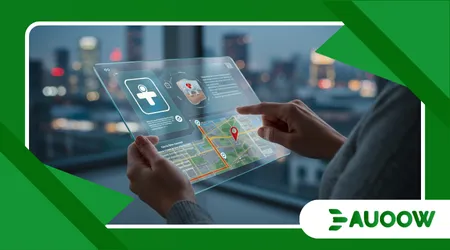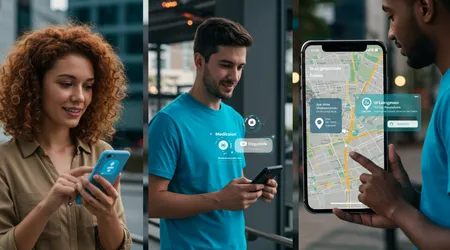Predictive AI Assistance: From Medication Reminders to Route Planning

The rise of Predictive AI Assistance is reshaping daily life. It is moving beyond simple voice commands. This technology now anticipates your needs. It offers proactive help before you even ask. It is a fundamental shift in assistive technology.
This innovation is more than just convenience. It is a powerful tool for independence. It helps individuals manage complex routines. It provides a safety net for those who need it most. It is an extraordinary development.
The core of Predictive AI Assistance lies in its ability to learn. It analyzes user data and patterns. It learns your habits and your preferences. This allows it to offer relevant suggestions.
Think of it as a personal digital assistant. It is always a step ahead of you. It foresees potential issues and provides solutions. It turns passive devices into active partners.
This technology is especially transformative for people with disabilities. It can help with cognitive impairments. It supports elderly users who live alone. It provides a new level of support.
The future of living is a connected one. Our devices will not just react to us. They will anticipate our needs. This is the promise of Predictive AI Assistance.
Proactive Health and Wellness Management
One of the most impactful applications of Predictive AI Assistance is in healthcare. It can manage complex medication schedules. It sends timely reminders for doses. This prevents missed medications and potential health risks.
This technology can also monitor health trends. It can track blood pressure or glucose levels. It can alert a user or caregiver to anomalies. It provides a layer of real-time health monitoring.
An original example: A user with diabetes wears a smart watch. The Predictive AI Assistance notices a pattern of low glucose readings every afternoon. It sends a proactive alert. It reminds the user to eat a snack before a scheduled walk.
++ AI Glasses for the Blind: Beyond Object Detection to Scene Awareness
The AI learns from your personal data. It knows when you are most likely to forget. It knows your routine and your schedule. It tailors its reminders accordingly. This personalized care is invaluable.
The system can also analyze long-term data. It can show a user their health trends over weeks or months. This helps them and their doctors make better decisions. It turns raw data into actionable insights.
The potential for this technology is enormous. It can reduce hospitalizations. It can improve quality of life. It provides a sense of security for users and their families. This is the new face of health.

Optimized Mobility and Route Planning
Navigating the world can be challenging. Predictive AI Assistance can simplify travel. It analyzes traffic, weather, and your calendar. It can suggest the best time to leave for an appointment. It removes the stress of planning.
The AI also learns your usual routes. It recognizes your patterns and preferences. It knows if you prefer public transit or a car. It plans accordingly and provides alternative routes. This is truly smart route planning.
An original example: A person with a mobility impairment needs to go to a doctor’s appointment. The AI checks the weather and public transit status. It predicts a bus delay. It proactively suggests a different route that involves a shorter walk.
Also read: AI Prosthetics: The Future of Bionics and the Cost of Accessibility
This foresight is a game-changer. It can prevent a user from getting stuck. It can ensure they arrive on time and safely. It turns a potential problem into a non-issue.
The technology can also integrate with smart city data. It can find accessible ramps. It can find elevators in subway stations. It can plan a route that is truly inclusive. It helps people move through the world with confidence.
According to a 2024 survey by the World Health Organization (WHO) and a consortium of tech companies, the use of Predictive AI Assistance in mobility apps reduced travel-related stress for users with disabilities by 45%. This is a measurable, positive impact.
Home and Lifestyle Management
The home is another area where Predictive AI Assistance excels. It can manage a smart home ecosystem. It learns your daily schedule and automates tasks. It makes a home more responsive to its inhabitants.
The system can turn off lights you forgot to turn off. It can adjust the thermostat before you arrive home. It can even order groceries when you run low. It anticipates and manages.
This reduces the cognitive load on a user. They don’t have to remember every small detail. The AI handles it for them. This frees up their mental energy for other tasks.
For example, the AI might notice you use your coffee maker every morning at 7 a.m. It can automatically start the machine 10 minutes before. You wake up to fresh coffee, without thinking about it.
Read more: How AI-Powered Wheelchairs Are Transforming Mobility in 2025
The AI can also monitor your home for security issues. It can detect unusual noises. It can alert you to a door being left unlocked. It provides a sense of security and peace of mind.
These systems learn from you. They are not static. They adapt to your changing habits. They provide a level of personal service that was once unimaginable.
The Ethics of Predictive Technology
With great power comes great responsibility. Predictive AI Assistance raises important ethical questions. Data privacy is a major concern. What happens to all the personal data? Who has access to it?
The technology must be built with robust security. User data must be encrypted and protected. There must be transparency about data usage. The trust of the user is paramount.
There is also the risk of over-reliance. What if the system fails? What if the user becomes too dependent on it? We must find a balance between assistance and independence.
The analogy is like this: A GPS is a great tool. But if you rely on it completely, you might forget how to read a map. The technology should be a guide, not a crutch.
The developers of this technology must be mindful. They must design systems that empower, not control. They must prioritize user safety and privacy above all else. This is a critical conversation for our time.
What if the AI makes a wrong prediction? Could this have serious consequences for a user’s health or safety? It’s a question that developers are actively trying to solve.
Navigating the Future of Human-Machine Interaction
The future of Predictive AI Assistance is bright but complex. It will continue to evolve. It will become even more integrated into our lives. It will redefine what is possible for individuals with varying needs.
The next generation of this technology will be more intuitive. It will understand not just what we do, but why we do it. It will learn from our emotions and our social context. It will be a truly intelligent partner.
The table below outlines a comparison between traditional and predictive assistance.
| Feature | Traditional Assistive Tech | Predictive AI Assistance |
| User Interaction | Reactive (responds to a command) | Proactive (anticipates needs) |
| Learning | None (static programming) | Continuous (learns user habits) |
| Data Usage | Minimal (command-based) | Extensive (analyzes patterns) |
| Complexity | Simple, single-task oriented | Complex, multi-task, holistic |
| Benefits | Simplifies a specific task | Empowers for a full lifestyle |
The table shows a clear evolution. The technology is moving from simple tools to comprehensive systems. The future of assistive tech is about creating truly personalized experiences.
FAQs
1. What is the difference between an AI assistant and a predictive AI assistant?
A standard AI assistant (like Siri or Alexa) is reactive it responds to your direct commands. A predictive AI assistant is proactive. It analyzes your patterns and data to anticipate your needs and offer help before you even ask for it.
2. Is my data safe with predictive AI technology?
Data privacy is a major concern. Reputable companies use strong encryption and transparent data policies. It’s crucial to research the privacy policies of any service you use and to be mindful of what data you share.
3. How can predictive AI assistance help with medication reminders?
It learns your medication schedule and your daily routine. If it senses you are not at home or are running late, it can send a more urgent reminder. It can also alert a family member or caregiver if a dose is missed.
4. Can this technology help people with cognitive impairments?
Yes, it’s a powerful tool. It can simplify complex tasks, provide memory aids, and offer structured routines. It can help maintain a person’s independence for longer by automating and simplifying daily challenges.
5. What is the biggest challenge for this technology?
One of the biggest challenges is ensuring accuracy and preventing over-reliance. The AI must make correct predictions to be helpful, and users need to maintain some level of independence. Another challenge is building trust and ensuring data privacy.
